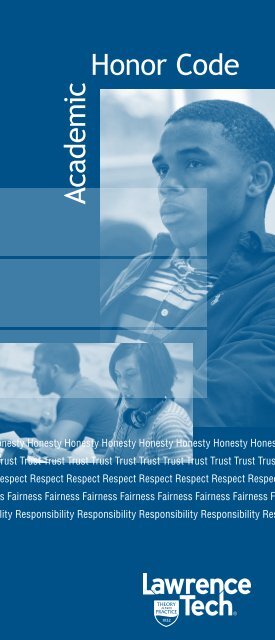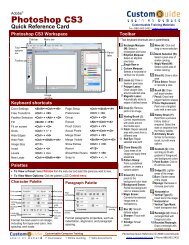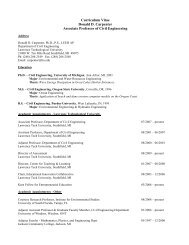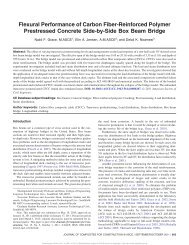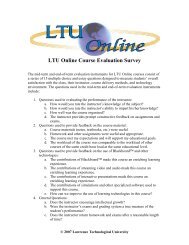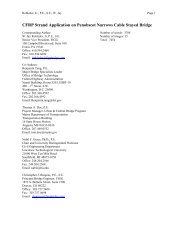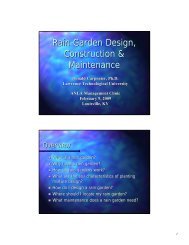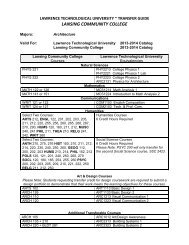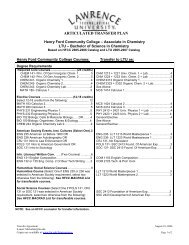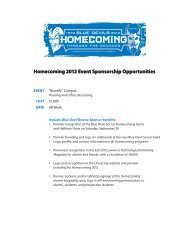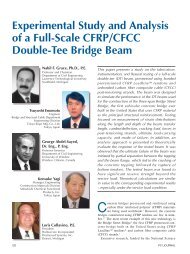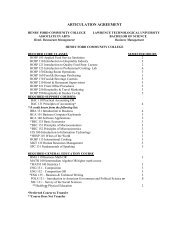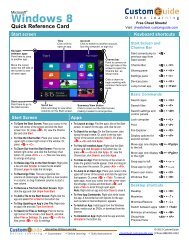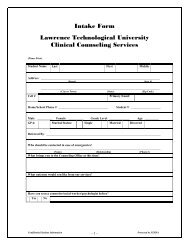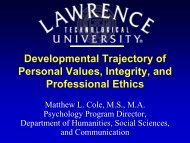PDF Version - Lawrence Technological University
PDF Version - Lawrence Technological University
PDF Version - Lawrence Technological University
You also want an ePaper? Increase the reach of your titles
YUMPU automatically turns print PDFs into web optimized ePapers that Google loves.
Academic Honor Code<br />
nesty Honesty Honesty Honesty Honesty Honesty Honesty Hones<br />
rust Trust Trust Trust Trust Trust Trust Trust Trust Trust Trust Trus<br />
spect Respect Respect Respect Respect Respect Respect Respec<br />
Fairness Fairness Fairness Fairness Fairness Fairness Fairness F<br />
ity Responsibility Responsibility Responsibility Responsibility Res
Academic Honor Code
Contents<br />
Introduction 4<br />
A. Academic Integrity 5<br />
B. Academic Dishonesty Offenses 5<br />
C. Jurisdiction 7<br />
D. Responsibility of the <strong>University</strong> Community 7<br />
E. Reporting and Adjudication Procedures 8<br />
F. Appeal Process 9<br />
G. Expulsion Proceedings 10<br />
Student Pledges 11
4<br />
Academic Honor Code<br />
INTRODUCTION<br />
Academic integrity and honesty are basic core values of<br />
<strong>Lawrence</strong> <strong>Technological</strong> <strong>University</strong>. In carrying out its<br />
academic mission, <strong>Lawrence</strong> <strong>Technological</strong> <strong>University</strong>,<br />
like all universities, depends on the honesty and integrity<br />
of its faculty, staff, and students, and for this reason every<br />
member of the <strong>Lawrence</strong> <strong>Technological</strong> <strong>University</strong><br />
community is charged with upholding the Academic Honor<br />
Code. Actions that breach the Code erode the trust of those<br />
who look to universities for honest evaluations of academic<br />
work arrived at through honest processes. Violations may<br />
also cause individual harm in that reports of performance<br />
made to post-graduate schools, professional societies, and<br />
employers would inaccurately represent a student’s progress.<br />
<strong>Lawrence</strong> <strong>Technological</strong> <strong>University</strong> is committed to creating<br />
an academic community that values both individual and<br />
collaborative efforts that promote learning and discovery.<br />
Such a community expects honesty and integrity in the<br />
work of all its members. The Academic Honor Code speaks<br />
to the work of individual students within the community. It<br />
should not be construed as arguing against the important<br />
collaborations that also occur among students on campus.<br />
This document is intended to clarify the adjudication of issues<br />
regarding academic honesty and fair play for students. Portions<br />
of this document have been adapted from (a) the 2002–03<br />
<strong>University</strong> of North Carolina at Wilmington Academic Honor<br />
Code and (b) the 2002–03 Binghamton <strong>University</strong> Academic<br />
Honesty Code.
5<br />
A. ACADEMIC INTEGRITY<br />
Students, faculty, and staff are expected to follow established<br />
standards of academic integrity and honesty. Academic<br />
misconduct entails dishonesty or deception in fulfilling<br />
academic requirements and includes but is not limited to<br />
cheating, plagiarism, or the furnishing of false information<br />
to the <strong>University</strong> or a <strong>University</strong> affiliate in matters related<br />
to academics. An affiliate of the <strong>University</strong> is any person,<br />
organization, or company who works in conjunction with<br />
<strong>Lawrence</strong> <strong>Technological</strong> <strong>University</strong> for the purposes of<br />
assisting students in fulfilling their academic requirements.<br />
It is therefore this institution’s stated policy that no form of<br />
dishonesty among its faculty or students will be tolerated.<br />
Although all members of the <strong>University</strong> community have an<br />
obligation to report occurrences of dishonesty, each individual<br />
is principally responsible for his or her own conduct.<br />
B. ACADEMIC DISHONESTY<br />
OFFENSES<br />
Violation of any of the following standards subject any<br />
student to disciplinary action:<br />
1. Plagiarism<br />
The term “PLAGIARISM” includes but is not limited to<br />
(a) the use, by paraphrase or direct quotation, of the published<br />
or unpublished work or creative and/or intellectual property<br />
in print, product, or digital media of another person without<br />
full and clear acknowledgment; (b) the unacknowledged use of<br />
materials prepared by another person or agency engaged<br />
in the selling of term papers, reports, or other academic<br />
materials; or (c) the appropriating, buying, receiving as a<br />
gift, or obtaining by any other means another person’s work<br />
and the unacknowledged submission or incorporation of it in<br />
one’s own work. Plagiarism is unethical, since it deprives the<br />
true author of his/her rightful credit and then gives that credit<br />
to someone to whom it is not due. Examples include:<br />
• Quoting, paraphrasing, or summarizing<br />
written material, even a few phrases, without<br />
acknowledgment.<br />
• Failing to acknowledge the source of either a<br />
major idea or an ordering principle central to<br />
one’s own paper.<br />
• Relying on another person’s data, evidence, or<br />
critical method without credit or permission.<br />
• Submitting another person’s work as one’s own.
6<br />
• Using unacknowledged research sources gathered<br />
by someone else.<br />
• Copying portions or outcomes of two- or threedimensional<br />
creative property of previously<br />
published work.<br />
• Copying items from Internet websites without<br />
acknowledgment of the source.<br />
2. Bribery<br />
The term “BRIBERY” includes the offering, giving, receiving,<br />
or soliciting of any consideration in order to obtain a grade or<br />
other treatment not otherwise earned by the student through<br />
his/her own academic performance.<br />
3. Cheating<br />
The term “CHEATING” includes but is not limited to<br />
(a) use of or giving to others any unauthorized assistance in<br />
taking quizzes or examinations; (b) dependence upon aids<br />
beyond those authorized by the instructor in writing papers,<br />
preparing reports, solving problems, or carrying out other<br />
assignments; (c) the acquisition, without permission, of tests<br />
or other academic material belonging to a member of the<br />
<strong>University</strong> faculty or staff; or (d) the unauthorized use of any<br />
electronic or mechanical device during any program, course,<br />
quiz, or examination or in connection with laboratory reports<br />
or other materials related to academic performance.<br />
4. Misrepresentation<br />
The term “MISREPRESENTATION” includes any act or<br />
omission undertaken with intent to deceive an instructor for<br />
academic advantage. Examples include:<br />
• Using a computer program generated by another<br />
and handing it in as one’s own work unless expressly<br />
allowed by the instructor.<br />
• Lying to an instructor to improve one’s grade.<br />
• Lying or misrepresenting facts when confronted<br />
with an allegation of academic dishonesty.<br />
5. Conspiracy<br />
The term “CONSPIRACY” means planning or acting with<br />
one or more persons to commit any form of academic<br />
dishonesty in order to gain academic advantage for oneself<br />
or another.<br />
6. Fabrication<br />
The term “FABRICATION” means the use of invented<br />
information or the falsification of research or other findings<br />
with the intent to deceive and thereby gain academic or<br />
professional advantage.
7<br />
7. Multiple Submissions<br />
The term “MULTIPLE SUBMISSIONS” means submitting<br />
substantial portions of the same work for credit more than<br />
once, unless there is prior explicit consent by the instructor(s)<br />
to whom the material is being or has been submitted.<br />
8. Unauthorized Collaboration<br />
The term “UNAUTHORIZED COLLABORATION”<br />
means collaborating on projects, papers, computer programs,<br />
lab reports, or other academic assignments where such<br />
collaboration has been prohibited by the instructor.<br />
9. Sabotage<br />
The term “SABOTAGE” means deliberately impairing,<br />
destroying, damaging, or stealing another’s work or working<br />
material. Examples include:<br />
• Destroying, stealing, or damaging another’s lab<br />
experiment, computer program, term paper, exam,<br />
or project.<br />
• Removing uncharged library materials with the<br />
effect that others cannot use them.<br />
• Defacing or damaging library materials with the<br />
effect that others cannot use them.<br />
• Hoarding or displacing materials within the library<br />
with the effect that others have undue difficulty<br />
using them.<br />
• Interfering with the operation of a computer system<br />
so as to have an adverse effect on the academic<br />
performance of others.<br />
C. JURISDICTION<br />
All students enrolled at <strong>Lawrence</strong> <strong>Technological</strong> <strong>University</strong> are<br />
subject to the Academic Honor Code.<br />
D. RESPONSIBILITY OF THE<br />
UNIVERSITY COMMUNITY<br />
1. General Responsibility<br />
It shall be the responsibility of every faculty member, student,<br />
administrator, and staff member of the <strong>University</strong> community<br />
to uphold and maintain the academic standards and integrity<br />
of <strong>Lawrence</strong> <strong>Technological</strong> <strong>University</strong>. Any member of the<br />
<strong>University</strong> community who has reasonable grounds to believe<br />
that an infraction of the Academic Honor Code has occurred<br />
has an obligation to report the alleged violation.
8<br />
2. Student Responsibility<br />
Each student shall abide by the Academic Honor Code at all<br />
times.<br />
3. The Responsibility of Individual Instructors<br />
Instructors are encouraged to make their classes aware of the<br />
Academic Honor Code during the first week of each term.<br />
4. Responsibility of the <strong>University</strong> Administration<br />
The Office of the Dean of Students is responsible for the<br />
publication and dissemination of the Academic Honor Code<br />
and any amendments or changes approved by the Deans<br />
Council with the recommendation of the Faculty Senate<br />
and the Faculty Councils of the colleges. All new <strong>University</strong><br />
faculty, administrative staff, personnel, and students should<br />
be advised of the Academic Honor Code upon becoming<br />
members of the <strong>University</strong> community.<br />
5. Responsibility of the Office of the Registrar and<br />
the Office of the Dean of Students<br />
The Office of the Registrar and the Office of the Dean of<br />
Students shall receive and maintain comprehensive records<br />
of all matters relating to violations of the Academic Honor<br />
Code. The Office of the Registrar will receive a copy of the<br />
decision letter completed by the dean of the college, to be<br />
included in the student’s academic record.<br />
E. REPORTING AND ADJUDICATION<br />
PROCEDURES<br />
1. An infraction of the Academic Honor Code may be<br />
reported by any member of the <strong>University</strong> community who<br />
has knowledge of such infraction. The infraction should be<br />
reported to the instructor of the course in which it occurred,<br />
where applicable. Such a report should be made within five<br />
(5) class days from the time of discovery unless extenuating<br />
circumstances prevent reporting.<br />
2. Any student charged with a violation under this Code<br />
shall be presumed not responsible until it is proven that, more<br />
likely than not, the violation of the rule or regulation occurred.<br />
3. Upon receiving a report of a violation or having<br />
reasonable evidence of a violation, the instructor in charge<br />
of the course or materials in question will inform the department<br />
chair or dean of the college in writing. The department<br />
chair or dean of the college will investigate the reported<br />
violation. The department chair or dean of the college will<br />
inform the student in writing of the reported violation and
9<br />
will request a written response from the student. If necessary,<br />
the department chair or dean of the college will conduct an<br />
interview with the student. The department chair or dean of<br />
the college will determine whether the student violated the<br />
Academic Honor Code.<br />
a. While action on a complaint of violating the<br />
Academic Honor Code is pending, the status of<br />
the student shall not be altered except for reasons<br />
outlined in Section J of the Student Code of<br />
Conduct.<br />
b. If the student is found in violation, the student<br />
will receive an F grade in the course. This grade<br />
will not be recomputed for GPA purposes. The<br />
department chair or dean of the college will notify<br />
the student in writing of the decision. A copy of the<br />
letter will be put in the student’s academic record<br />
and disciplinary file.<br />
c. A student found in second violation of the Academic<br />
Honor Code will be expelled from the <strong>University</strong>.<br />
See Article G for expulsion proceedings.<br />
4. If no action is taken by the instructor, the reporting<br />
party may file a written report of the allegation of academic<br />
dishonesty with the department chair or dean of the college.<br />
The department chair or dean of the college will investigate<br />
the reported violation. The investigative process will be<br />
conducted according to the provisions in Section E-3 above.<br />
5. A student who admits his or her involvement to a<br />
<strong>University</strong> official conducting the investigation in a case of<br />
academic dishonesty loses the right to appeal.<br />
F. APPEAL PROCESS<br />
1. Where appropriate, a student may appeal a finding<br />
of academic dishonesty to the dean of the college in which<br />
the course is offered within seven (7) class days. The appeal<br />
shall be in writing.<br />
2. An appeal shall be limited to the review of<br />
the following:<br />
a. To determine whether the student received<br />
fundamental fairness in the investigative and<br />
decision-making process.<br />
b. To determine whether the facts in the case were<br />
sufficient to establish that a violation of the<br />
Academic Honor Code occurred.<br />
c. To consider relevant and material new evidence.
10<br />
3. A student cannot appeal the sanction(s) for academic<br />
dishonesty.<br />
G. EXPULSION PROCEEDINGS<br />
1. Expulsion proceedings will be initiated by the dean<br />
of students for students found in second violation of the<br />
Academic Honor Code. The student will be contacted by<br />
the Office of the Dean of Students for a meeting to explain<br />
proceedings of expulsion.<br />
2. Students being expelled will receive written<br />
notification from the dean of students indicating the<br />
sanction of expulsion and the process for appeal.<br />
3. The sanction of expulsion may be appealed by the<br />
accused student to the provost within seven (7) school days<br />
of the decision. Such appeals shall be in writing and shall<br />
be delivered to the dean of students or designee.<br />
4. Except as required to explain the basis of new<br />
information, an appeal shall be limited to a review of the<br />
documents and notes of the department chair or dean of the<br />
college and the submission of information by the accused<br />
student and supporting documents for one or more of the<br />
following purposes:<br />
a. To determine whether the student received<br />
fundamental fairness in the investigative and<br />
decision-making processes.<br />
b. To determine whether the facts in the case were<br />
sufficient to establish that a violation of the<br />
Academic Honor Code occurred in both cases.<br />
c. To consider relevant and material new evidence.<br />
5. Following the appeal, the provost shall advise the<br />
accused student in writing of the determination of the<br />
appeal, and of the sanctions imposed, if any. A copy of the<br />
notification will be retained in the student’s academic record<br />
and the student’s disciplinary record.<br />
Adopted: March 2004<br />
Revised: February 2007, October 2008
11<br />
STUDENT PLEDGES<br />
In adopting this Academic Honor Code, students of<br />
<strong>Lawrence</strong> <strong>Technological</strong> <strong>University</strong> recognize that academic<br />
honesty and integrity are fundamental values of the <strong>University</strong><br />
community. The quality of a <strong>Lawrence</strong> <strong>Technological</strong><br />
<strong>University</strong> education is dependent upon the community<br />
acceptance and enforcement of the Academic Honor Code.<br />
Students who enroll at <strong>Lawrence</strong> <strong>Technological</strong> <strong>University</strong><br />
commit to holding themselves and their peers to the highest<br />
standard of academic integrity. An individual who becomes<br />
aware of a violation of the Academic Honor Code has an<br />
obligation to report this violation.<br />
Members of the <strong>Lawrence</strong> <strong>Technological</strong> <strong>University</strong><br />
community pledge to hold themselves and their peers to<br />
the highest standards of academic honesty and integrity.<br />
Undergraduate Students<br />
The following pledge is required on all academic<br />
work submitted by undergraduate students at<br />
<strong>Lawrence</strong> <strong>Technological</strong> <strong>University</strong>:<br />
“I have neither given nor received unauthorized<br />
aid in completing this work, nor have I presented<br />
someone else’s work as my own.”<br />
Graduate Students<br />
All graduate students at <strong>Lawrence</strong> <strong>Technological</strong><br />
<strong>University</strong> are required to sign the student pledge when<br />
they begin graduate studies:<br />
“I pledge that on all academic work that I submit,<br />
I will neither give nor receive unauthorized aid, nor<br />
will I present another person’s work as my own.”<br />
Adopted: March 2004<br />
Revised: September 2009
<strong>Lawrence</strong> <strong>Technological</strong> <strong>University</strong> | Office of the Provost<br />
21000 West Ten Mile Road, Southfield, MI 48075-1058 | ltu.edu<br />
Rev. 11.09


